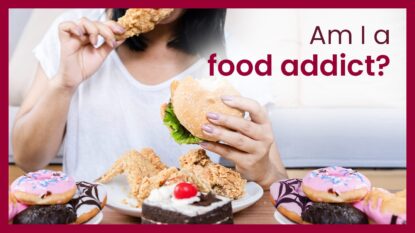Food addiction is a relative newcomer to the list of substances and behaviours included in medical journals. But the food industry knows food addiction well.
American market researcher and psychophysicist Howard Moskowitz uncovered a phenomenon known as the bliss point. This term signifies the amounts of salt, sugar or fat that the food industry mix together in certain foods to create the biggest high in our brains. Food giants have spent millions in its pursuit.
When does that desire turn into addiction?
Dr Gabor Mate is a world-renowned addiction specialist. He describes addiction as “Any behaviour, substance related or not, that a person engages in, finds temporary pleasure or relief in, but suffers negative consequences and they still don’t give it up”.
Getting an artificial high from food!
Brain science has moved on leaps and bounds over recent years and helps explain some of the physiological processes involved in addictive behaviours.
Scans of the brain have repeatedly demonstrated that when people eat food rich in carbohydrates – bread, pastry, sweets and chocolate– it lights up the same reward areas in the brain, for instance, as alcohol and drugs.
The neurotransmitter, dopamine, is the chief driver for behaviours that can become addictive. When behaviour becomes excessive, the brain realises it’s being over-stimulated and releases chemicals that dilute pleasure sensations.
This is why, in any addictive process, the addict craves more and more of their chosen substance or activity. It’s needed to maintain the original level of pleasure. It also explains why addiction is viewed as a progressive condition.
When the addict tries to fight it, they typically face the prospect of some withdrawal symptoms. Reducing carbs can be experienced as having a headache for a day or two, contributing to the difficulty of starting a diet.
The physiological explanation is that there’s a depletion of serotonin (the key feel-good hormone). All the while, dopamine – the ‘drive’ hormone – is still secreted. It is effectively urging them to re-engage with their old behaviours, which is why putting down an addiction can feel so challenging.
Hunger doesn’t make you obese
Just as the alcoholic does not drink excessively because they are thirsty, the food addict does not eat excessively because they are physically hungry. Therefore, in order to tackle food addiction, you have to make the distinction between physical and emotional hunger. Often, we think we are physically hungry when in fact we are actually emotionally challenged; lonely, bored, sad, tired, frustrated, stressed, the list goes on. Food soothes and medicates, so it’s very easy to fool yourself into thinking you genuinely need a meal or snack.
Food as a painkiller
Weight gain is a complex subject and certainly not the same story for everyone. It is not simply explained by a mix of chemicals inside us. We learn from a young age that certain substances act as powerful painkillers, that we think help us to ‘cope’. Therefore, something as seemingly innocuous as food becomes intrinsically associated with safety, comfort, reward and escape.
Of course, there are also those people who lack knowledge about food. They may become hooked on carbs due to habitual consumption and remain none the wiser. It is only when they cut down, they are hit with an avalanche of discomfort. Without the support of others, they return again and again to the perpetual ups and downs of so-called yo-yo dieting.
However, just as we never ‘unlearn’ our ability to ride a bike, the addict never fully forgets the rewarding feelings triggered by their addiction. Whether explained by physiological or psychological research, that is part of the reason why so many return to old behaviour.
Once you’ve created the habit of turning to food to cope, the opportunity to explore all this stuff without help is tough. You need to keep eating simply to avoid the symptoms of withdrawal. The food may no longer create particularly pleasurable feelings but to stop seems virtually impossible.
Singer Elton John once described bread as his ‘drug of choice’: “I no longer drink alcohol, take drugs, eat white flour or sugar and I no longer purge myself bulimically”. In other words, Elton found white flour and sugar every bit as harmful and addictive as the hard drugs that blighted his earlier life.
This is why so much addiction-recovery work focuses on empowering the individual with knowledge, understanding and group support.



